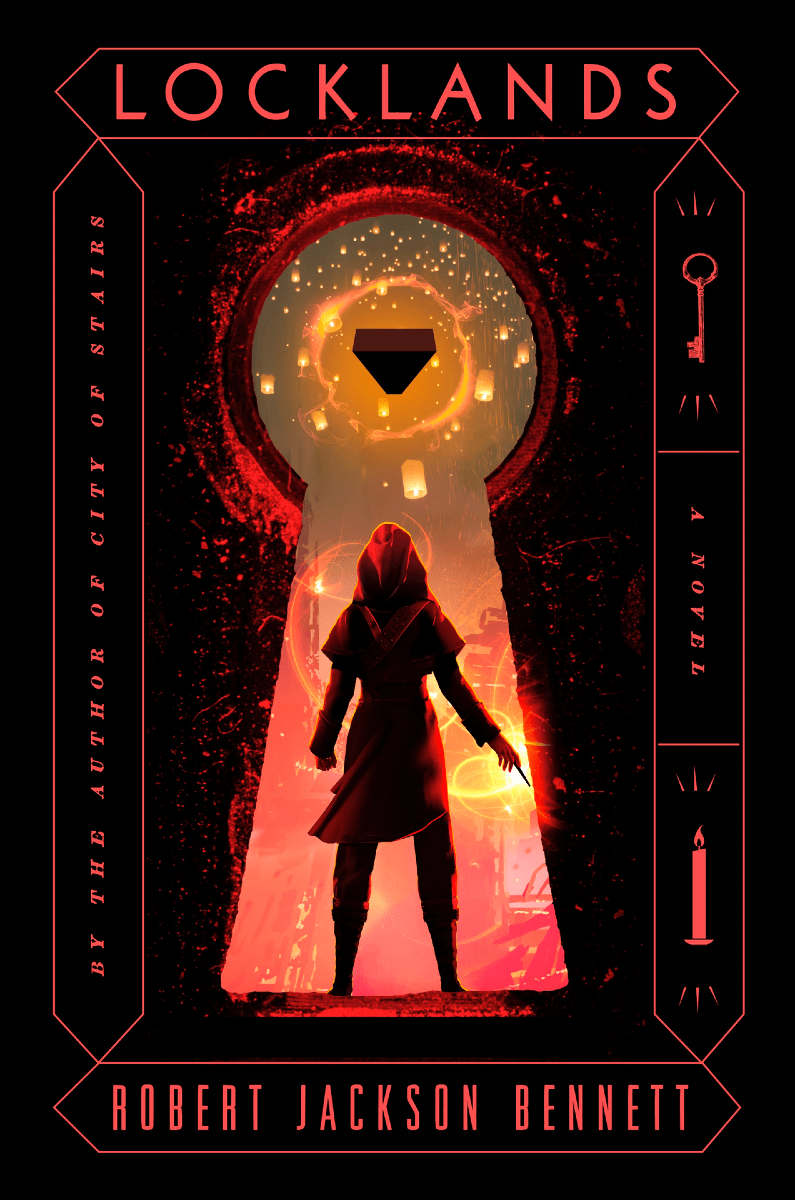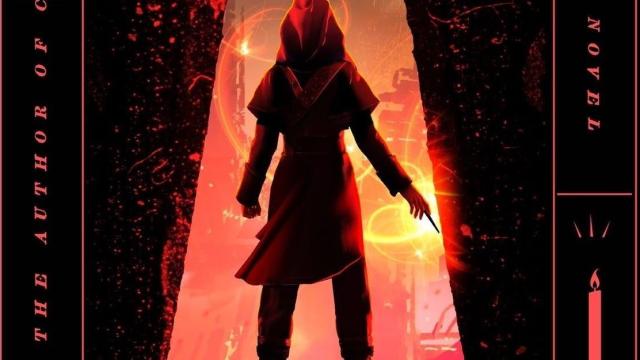Hugo nominee Robert Jackson Bennett began his critically acclaimed Founders trilogy in 2018 with epic fantasy Foundryside, followed by 2020’s Shorefall. Next year, he’ll reveal the much-anticipated concluding volume, Locklands — but we’ve got a sneak peak, including the cover and an excerpt, to share today.
Here’s a description of the book, appearing here for the first time:
A god wages war — using all of humanity as its pawns — in the unforgettable conclusion to the Founders trilogy.
Sancia, Clef, and Berenice have gone up against plenty of long odds in the past. But the war they’re fighting now is one even they can’t win.
This time, they’re not facing robber-baron elites, or even an immortal hierophant, but an entity whose intelligence is spread over half the globe — a ghost in the machine that uses the magic of scriving to possess and control not just objects, but human minds.
To fight it, they’ve used scriving technology to transform themselves and their allies into an army — a society — that’s like nothing humanity has seen before. With its strength at their backs, they’ve freed a handful of their enemy’s hosts from servitude, even brought down some of its fearsome, reality-altering dreadnaughts. Yet despite their efforts, their enemy marches on — implacable. Unstoppable.
Now, as their opponent closes in on its true prize — an ancient doorway, long buried, that leads to the chambers at the centre of creation itself — Sancia and her friends glimpse a chance at reaching it first, and with it, a last desperate opportunity to stop this unbeatable foe. But to do so, they’ll have to unlock the centuries-old mystery of scriving’s origins, embark on a desperate mission into the heart of their enemy’s power, and pull off the most daring heist they’ve ever attempted.
And as if that weren’t enough, their adversary might just have a spy in their ranks — and a last trick up its sleeve.
And here’s the full cover by Will Staehle, followed by the excerpt.

She cleared her throat, and asked, “Are you familiar with twinning?”
Governor Malti looked up at her. “T-Twinning?” he said absently. He looked about the map room as if trying to find a scriver to consult, but seemed to have forgotten he’d had the room cleared for this conversation. “I believe so. It’s a scriving method, mostly for communication, yes?”
“Yes,” said Berenice. “It’s a scrived way of asserting that one thing is another, or like another. Write the correct sigils on two panes of glass so they become twinned, then tap one with a hammer, and both will break. Twin two pieces of metal, heat one up, and the other will grow hot.” She leaned forward over the maps. “The enemy you fight – the one we all fight – is using an advanced form of twinning to wage its war. That’s how it’s managed to conquer so much territory – all in only eight years.”
She touched the largest map, depicting the Durazzo Sea and all the lands surrounding it, and the taint of red flooding throughout nearly all the territories in the north.
“The enemy captured all that,” said Malti dubiously, “with twinning?”
“Yes,” said Berenice. “Because it knows how to twin something very unusual.” She looked at him. “Minds,” she said.
Malti stared. He looked to his mercenary chief, who shrugged, bewildered.
“Twin minds? What does that mean?” Malti demanded.
Berenice stood and walked to where the crate still waited on the table. “May I finally show you our gift?”
Malti looked at the crate warily, then nodded. Berenice opened it, then turned it over and spilled it onto the ground.
A scrived rig slipped out of the crate and clanked onto the floor. It was an odd little device, wrought of wood and steel and built in a clunky, improvised manner, with inner plates left exposed like the designer was indifferent as to whether it looked decent or not. Yet anyone with any familiarity with scrived rigs could recognise that it was an awkward pairing of two common devices: an espringal, and a lamp.
“A… floating lamp?” asked one of Malti’s lieutenants.
“Yes. One that fires a very strange ammunition,” said Berenice. “Not a bolt, but a scrived plate. A small one. Your son was almost certainly shot with such a plate.” She tapped her right temple. “It buried itself in his skull, and then his mind was twinned. With the enemy. Two things made alike. The enemy scrived his body, his very being, and its thoughts became his. It saw what he saw, its mind became his mind, and it told him what to do – and he did it, because his will was no longer his own.” She sat back down. “And you brought him back to your city. Where the enemy could see everything through his eyes, hear everything through his ears, and wait for the chance to attack.”
Malti’s ashen face grew even paler. “That can’t be. This is… This is my child you’re talking about.”
“And you know what he did at Corfa,” said Claudia. “Something he’d never normally do, yeah? Something you’d normally think was mad?”
“But you’re asking me to believe the unbelievable,” said Malti. “Scriving is about… about stuff.” He rapped the table beside him. “Bolts. Swords. Ships. Walls. Scriving the mind is… it’s simply mad!”
Claudia met Berenice’s eyes. Is now when you tell him we all have our own little plates in our bodies? Ones that allow us to share thoughts and all kinds of crazy shit?>
said Berenice. Saying that would probably get us burned alive like witches.>
Yet she had far more personal reasons to avoid this subject. Bringing that up would undoubtedly lead Malti to ask how Giva had come to learn this technique; and if she were to tell the truth, she would have to admit that she had been one of the scrivers to develop it, before it was stolen by their enemy; and thus she herself bore some guilt for the hundreds of little cities daubed with red on the maps stretched across the table, and the thousands of refugees outside the walls of Grattiara who had escaped the onslaught – as well as all those who had not.
Stop, she told herself. Fight the battles before you, not the ones from so long ago.
“Even if you are telling the truth,” said Malti, “why did you bring me this… this lamp as a gift? Did you know my son was suffering from this affliction?”
“No,” said Berenice. “I brought you this to warn you, to tell you what was coming, and how all the rest of these cities had fallen. And how your city will fall as well.” She pressed a hand to the sea of red on the map like it was a wound. “You’ll first see just one lamp, floating at your walls,” she said. “If you see it at all, that is.”
“It’ll probably come at night,” said Vittorio flatly from the end of the table. “They’re small. Hard to see in the dark.”
“It’ll target one of your soldiers,” said Claudia. “Shoot them anywhere – head, hand, back, it doesn’t matter. It just needs to be buried in living flesh for the scriving to work.”
“Then it’ll twin that solider – own them, take them over – and use them to see,” said Diela, quietly and meekly. Her eyes were large underneath her helmet. “To see what defences you have. Where your people are stationed.”
“Where you’re strong,” said Vittorio. “Where you’re weak. What you’re saying, what you’re planning.”
“It’ll pick the perfect time to attack,” said Claudia.
“And then the sky will fill with these,” said Berenice, kicking the lamp with one foot. “They’ll descend on your soldiers like locusts, because they’ll know where to find them. They’ll shoot them, plate them, twin them, turn them. The soldiers will go to your defences and kill the people manning them, or open up the gates, or set fire to the buildings, the homes, maybe their own homes. Anything.”
“We call them ‘hosts,’” said Claudia quietly. “Because once one of those plates are in them, you have to recognise that they’re not themselves anymore. That they’re not human anymore. Not really.”
“They’re twinned with something different,” said Berenice.
A flash of an image in her mind: a man standing in a shadowy corner, then turning to face her; then pale light glancing across his features, revealing his eyes and nose and mouth streaming blood…
“Something monstrous,” she said softly. “Something we can’t really understand.”
“This is all ludicrous bullshit,” snarled one of the mercenary captains. “Lamps that can target? Shoot? I remember when scrivers tried to rig up lamps to bring baskets of fruit to people’s homes, there were melons tumbling everywhere. The idea of one wielding an espringal is beyond foolishness.”
Claudia shook her head. “The lamps aren’t doing the aiming and shooting any more than a normal espringal does.”
“You mean they’re being controlled by someone at a distance?” Malti asked. “Who?”
The Givans exchanged a glance.
said Diela.
No,> said Berenice.
“By the enemy,” said Berenice. But she knew as she said it that the answer wouldn’t satisfy.
“By its infantry?” asked Malti. “Then why can we not deploy our sharpshooters to eliminate them? Stop the people controlling the lamps before they can attack us?”
“No,” said Berenice. She grimaced as she struggled to imagine how to say this. “Not by its infantry. Because all of the enemy’s forces – the infantry, the lamps, its ships, everything – are controlled at a distance. By one thing.”
“One mind,” said Claudia.
“One entity,” said Diela. “Seeing out of many eyes. Working many hands. Controlling many, many rigs – all across the continent, simultaneously.”
“One mind twinned to exist in many places at once,” said Vittorio. “In anything scrived – rigs or people.”
Malti stared at them, horrified. “No,” he said softly. “That’s impossible.”
“Have you never wondered, your grace,” said Berenice, “how the enemy can manoeuvre so perfectly? How it appears to communicate almost instantaneously? How its shriekers always hit targets out of line of sight of their artillery teams? And why it never, ever bothers to even try to negotiate? Why it never sends emissaries, never announces itself, why it’s never even named itself to you?”
Malti was staring at the map, his flesh nearly colourless, the bristles of his beard trembling.
“It sounds inhuman,” said Berenice, “because it is inhuman.”
He swallowed. He sat in silence for a long time, then turned to the plating lamp on the floor. “You didn’t come just to persuade me to let you take the refugees, did you,” he said quietly.
“No,” said Berenice. “We came to ask you to leave as well. You, and all your men.”
“To come with us,” said Diela. “Where you can be safe.”
“Because there is no standing your ground against this,” said Claudia. “No pitched battles. No sieges. No blast of trumpets and glorious charge of men-at-arms.”
“The warfare of the merchant houses is gone,” said Vittorio. “This is different.”
Berenice shot him a glare. “Warfare has changed. So we must change. All of us. Including you, your grace.”
From the book Locklands by Robert Jackson Bennett. Copyright © 2022 by Robert Jackson Bennett. Reprinted by arrangement with Del Rey Books, an imprint of Random House, a division of Penguin Random House LLC. All rights reserved.
Locklands by Robert Jackson Bennett will be out June 21, 2022; you can pre-order a copy here.
